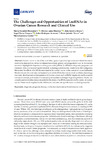The Challenges and Opportunities of lncRNAs in Ovarian Cancer Research and Clinical Use

Use este enlace para citar
http://hdl.handle.net/2183/25604
A non ser que se indique outra cousa, a licenza do ítem descríbese como Atribución 4.0 Internacional
Coleccións
- Investigación (FCS) [1293]
Metadatos
Mostrar o rexistro completo do ítemTítulo
The Challenges and Opportunities of lncRNAs in Ovarian Cancer Research and Clinical UseAutor(es)
Data
2020-04-21Cita bibliográfica
Salamini-Montemurri, M., Lamas-Maceiras, M., Barreiro-Alonso, A., Vizoso-Vázquez, Á., Rodríguez-Belmonte, E., Quindós-Varela, M., & Cerdán, M. E. (2020). The Challenges and Opportunities of LncRNAs in Ovarian Cancer Research and Clinical Use. Cancers, 12(4), 1020. doi:10.3390/cancers12041020
Resumo
[Abstract] Ovarian cancer is one of the most lethal gynecological malignancies worldwide because it tends to be detected late, when the disease has already spread, and prognosis is poor. In this review we aim to highlight the importance of long non-coding RNAs (lncRNAs) in diagnosis, prognosis and treatment choice, to make progress towards increasingly personalized medicine in this malignancy. We review the effects of lncRNAs associated with ovarian cancer in the context of cancer hallmarks. We also discuss the molecular mechanisms by which lncRNAs become involved in cellular physiology; the onset, development and progression of ovarian cancer; and lncRNAs’ regulatory mechanisms at the transcriptional, post-transcriptional and post-translational stages of gene expression. Finally, we compile a series of online resources useful for the study of lncRNAs, especially in the context of ovarian cancer. Future work required in the field is also discussed along with some concluding remarks.
Palabras chave
Diagnosis
Prognosis
Therapy
Molecular mechanisms
Bioinformatics tools
Prognosis
Therapy
Molecular mechanisms
Bioinformatics tools
Versión do editor
Dereitos
Atribución 4.0 Internacional
ISSN
2072-6694






